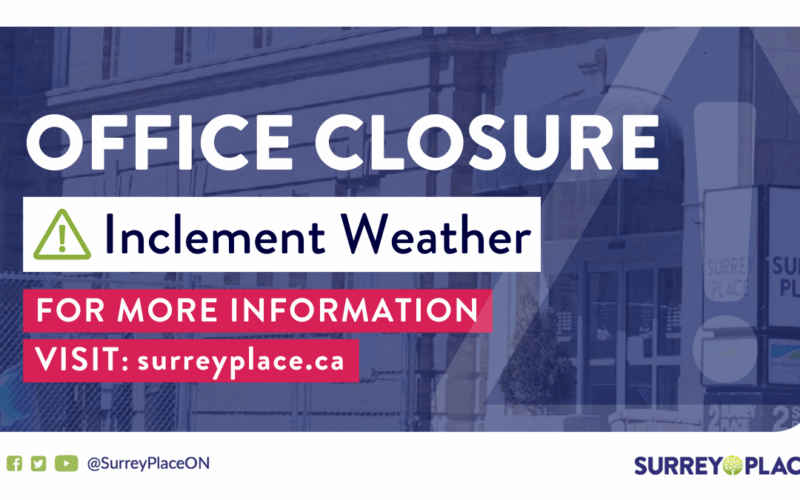Turning 18 is a big step in any young person’s life. For people with autism and their families, it also means changes in the services they can receive. Youth programs end, and new adult services begin, but the process can be confusing.
At Surrey Place, we’re here to help make this transition easier. As the agency that hosts Developmental Services Ontario (DSO) for the Toronto Region, the access point for adult developmental services funded by the Ministry of Children, Community and Social Services (MCCSS) in Ontario, we support individuals and families as they move into the adult system.
Table of contents
- Understanding Developmental Services (DSO)
- Key Service Changes After Age 18
- Adult Autism Services Offered at Surrey Place
- Building Life Skills for Greater Independence
- Planning Financially for Adulthood
Understanding Developmental Services Ontario (DSO)
Developmental Services Ontario (DSO) is your gateway to accessing most government-funded adult developmental services in Ontario. In Toronto, Surrey Place is home to DSO Toronto Region (DSOTR), where we help eligible individuals apply for the services they need.
Families can begin the intake process as early as age 16 or 17 to avoid service gaps and allow time to prepare. Here’s what the process typically looks like:
- Confirming eligibility – You must be 18 or older, live in Ontario, and have a documented developmental disability.
- Gathering paperwork – Includes assessments from doctors or psychologists, and proof of residency.
- Meeting with DSO staff – To discuss your needs, strengths, and goals.
- Getting connected – DSOTR refers you to programs and supports when they become available.
DSO can connect you to:
- Supported housing or independent living options
- Day programs and community participation supports
- Employment readiness and job coaching
- Clinical supports
If you don’t currently have a family doctor, this is also a good time to find one and establish care. A family physician can support continuity as your child enters adulthood.
DSO Toronto Region helps people and families understand their options. You don’t have to do it alone, we’re here to guide you.
Jeanny Scantlebury, Vice President, Adult Services
Key Service Changes After Age 18
In Ontario, most autism and developmental services for children end at age 18. At that point, families need to apply for adult services through a different system. Some important changes include:
- Youth services don’t continue automatically — A new application through Developmental Services Ontario (DSO) is required to determine and access adult supports.
- New eligibility rules — DSO will be guide you through the eligibility process, which includes psychological assessments and proof of residency. It’s helpful to begin gathering paperwork such as assessments from psychologists or doctors, well before your child turns 18.
- Different goals — Compared to services for children, adult services focus more on life skills, independence, jobs, and community participation. This includes housing supports, respite for caregivers, supports to help take part in the community, specialized and clinical supports, Adult Protective Service Worker Program, and the Passport program. As part of planning, families can also begin exploring financial supports available in adulthood.
It may feel like a big change, but with the early planning, families can navigate these changes with more confidence and less stress.
Adult Autism Services Offered at Surrey Place
If your child is already a client at Surrey Place and they’re about to head into adulthood, we can help with an easy transition to adult services.
In addition to being the DSO agency for Toronto, we offer many programs designed to support adults with autism. These services aim to build skills, stay healthy, and encourage meaningful community involvement. Some of our adult services include:
- Social skills groups (managing money, self-regulation and relationship building)
- Clinical services (psychology, speech therapy, occupational therapy)
- Behaviour support and safety planning
- Support for caregivers and families
Our adult programs are based on dignity and independence. We want to help adults with autism live meaningful lives and feel included in their communities.
Jeanny Scantlebury, Vice President, Adult Services
Building Life Skills for Greater Independence
Life skills are a key part of becoming more independent. For many adults with autism, learning to manage everyday tasks can build confidence and unlock new opportunities for work, relationships and participation in the community. These skills can be practiced at home, in the community, or with support from a caregiver or therapist. Examples include:
- Cooking and planning simple meals
- Using a debit card and managing a basic budget
- Doing laundry and cleaning
- Using transit and scheduling appointments
- Personal hygiene and dressing for different situations
We work with each person as an individual. We want to help adults reach their goals and live as independently as possible.
Jeanny Scantlebury, Vice President, Adult Services
Planning Financially for Adulthood
Adulthood also brings new financial considerations. Government programs are available to help, but they require preparation. Surrey Place’s Individualized Funding (IF) Library is a free online resource that makes navigating these systems easier. Through the IF Library, you can:
- Learn about the Ontario Disability Support Program (ODSP), which provides monthly support and health benefits
- Understand how to apply for Passport Funding to help pay for programs, activities, and caregiver relief
- Explore Registered Disability Savings Plan (RDSP) to plan for long-term financial security
- Track and manage funding sources in one place
- Learn about supported decision-making, such as guardianship or powers of attorney
Families who start planning early are better prepared.
Jeanny Scantlebury, Vice President, Adult Services
Whether your loved one is preparing to turn 18 or already navigating the adult system, Surrey Place is here to help. Explore our programs, connect with Developmental Services Ontario (DSO), and find out how we support adults with autism at every stage.


